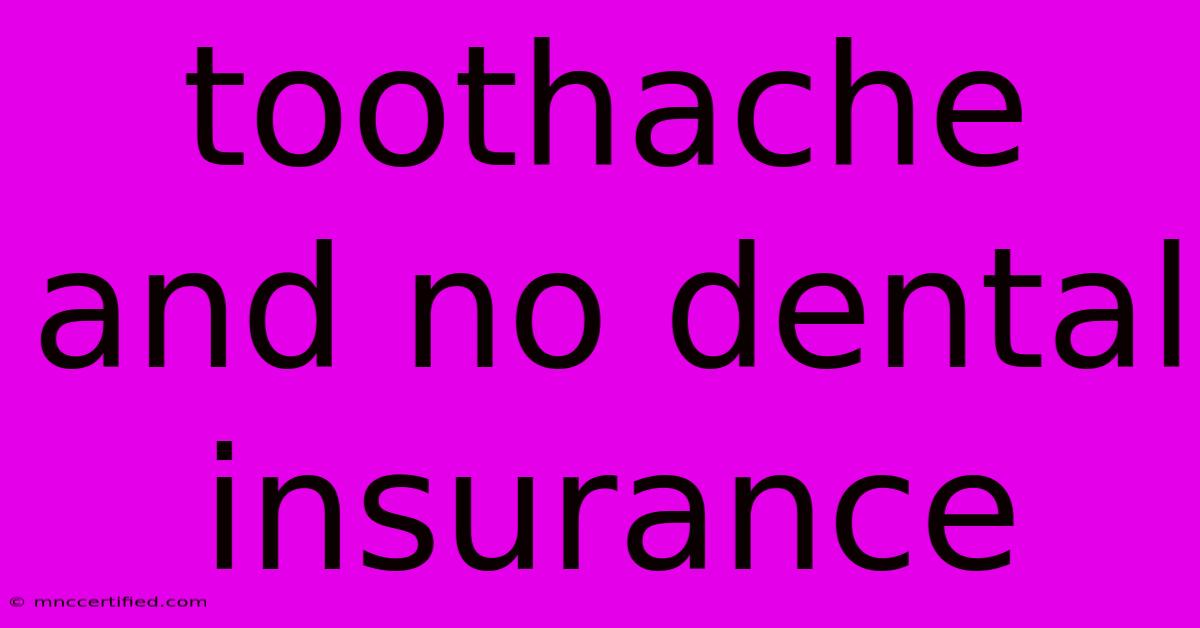Toothache And No Dental Insurance

Table of Contents
Toothache Agony? No Dental Insurance? You're Not Alone.
A throbbing toothache is one of life's most excruciating experiences. It can disrupt sleep, affect your work, and generally make you miserable. But what happens when you're facing this pain, and you don't have dental insurance? The situation can feel incredibly daunting, but don't despair. This guide will explore options to help you manage your toothache and access affordable dental care, even without insurance.
Understanding the Urgency of Toothaches
Ignoring a toothache is never a good idea. A seemingly minor ache can quickly escalate into a severe infection, leading to:
- Abscesses: Pus-filled pockets that can cause significant pain and spread infection.
- Cellulitis: A serious bacterial infection of the face and neck.
- Loss of teeth: Untreated tooth decay and infections can ultimately result in tooth extraction.
Seeking immediate attention is crucial if you experience:
- Severe, throbbing pain: This suggests a potential infection.
- Swelling in your face or jaw: This is a clear sign of infection.
- High fever: A sign your body is fighting a serious infection.
- Difficulty swallowing or opening your mouth: These symptoms require immediate medical attention.
Finding Affordable Dental Care Without Insurance
Navigating the dental care system without insurance can be tricky, but several avenues exist to access affordable treatment:
1. Dental Schools and Teaching Clinics
Dental schools often offer significantly discounted services, as students perform procedures under the supervision of experienced dentists. The quality of care is generally high, and the cost is significantly lower than private practices. Search online for "dental school clinics near me" to find options in your area.
2. Community Health Centers and Federally Qualified Health Centers (FQHCs)
FQHCs provide comprehensive primary and preventative healthcare, often including dental services, on a sliding fee scale based on your income. They offer care to individuals regardless of their insurance status. You can find a list of FQHCs on the Health Resources & Services Administration (HRSA) website.
3. Dental Discount Plans
Unlike insurance, dental discount plans offer reduced rates at participating dentists. These plans usually require a yearly membership fee, but the savings can be substantial, especially for routine cleanings and checkups. Research different plans to compare costs and participating dentists in your area.
4. Emergency Rooms
While not ideal for routine dental care, emergency rooms can address severe toothaches requiring immediate attention, such as abscesses. However, expect higher costs compared to other options, and ERs are primarily for emergencies, not ongoing dental issues.
5. Negotiating Payment Plans with Dentists
Many dentists are willing to work with patients who lack insurance. Don't hesitate to discuss payment plans or options for breaking down treatment costs into manageable installments. Transparency is key – be upfront about your financial limitations.
Preventing Future Toothaches: Proactive Steps
Preventing toothaches is crucial, even without insurance. Practicing good oral hygiene is paramount:
- Brush your teeth twice daily: Use fluoride toothpaste and a soft-bristled brush.
- Floss daily: This removes plaque and food particles from between your teeth.
- Rinse with mouthwash: Helps to kill bacteria and freshen breath.
- Regular dental checkups: Even if you can't afford extensive treatment, regular checkups can identify problems early, preventing them from escalating into major, expensive issues.
Conclusion: You Have Options
A toothache without dental insurance can be stressful, but it doesn't have to be insurmountable. By exploring the options outlined above and prioritizing preventative oral care, you can manage your pain and access affordable dental treatment. Remember, early intervention is key to preventing more significant and costly problems down the line. Don't suffer in silence – take action today.

Thank you for visiting our website wich cover about Toothache And No Dental Insurance. We hope the information provided has been useful to you. Feel free to contact us if you have any questions or need further assistance. See you next time and dont miss to bookmark.
Featured Posts
-
Post Fcc Whats Next For Brendan Carr
Nov 19, 2024
-
Denmark Needs Adjustments To Beat Spain
Nov 19, 2024
-
Dune Sisterhood Prophecy Review Gloom
Nov 19, 2024
-
Thanksgiving Dinner In Utah Best Spots
Nov 19, 2024
-
Updated Nottinghamshire Weather Warning From Met Office
Nov 19, 2024